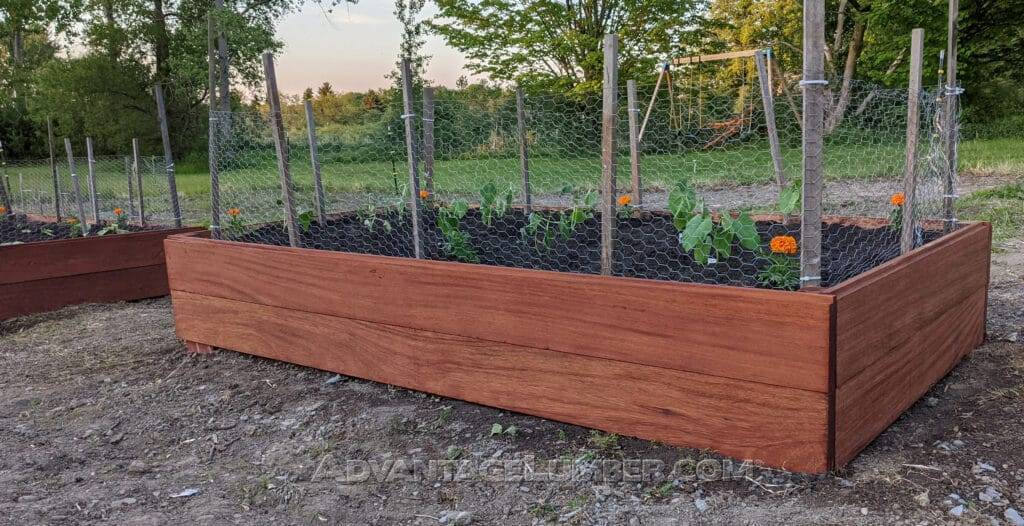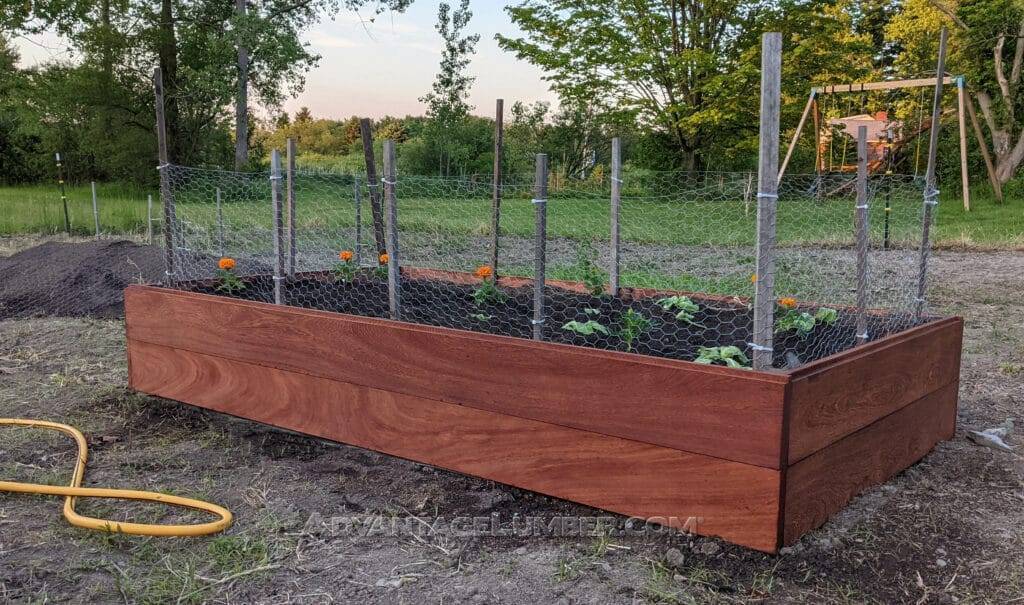
The best wood for raised garden beds should last a long time without the need for chemical treatment.
Many homeowners looking to build raised garden beds want to grow fresh high quality vegetables they know are free from pesticides and chemicals.
In order to grow your vegetables without chemicals many experts recommend using natural materials that can not leach potentially harmful chemicals into your soil that then end up in your vegetables.
As a results most organic gardeners do not recommend the use of pressure treated wood.
Pressure treated wood is treated with chemicals to prevent the wood from rotting.
Older pressure treated wood contained CCA (chromated copper arsenate).
The EPA banned CCA in 2003 due to arsenic leaching from the pressure-treated wood and into the soil which can contaminate plants and people.
While the new pressure treated wood uses safer synthetic materials. The USDA Organic guidelines still doesn’t recommend them for organic growing:
“A number of synthetic materials are now commonly used in place of CCA. These include alkaline copper quaternary, copper azole, and micronized copper azole. These materials are not currently allowed in organic production, as they are not included on the National List.” – USDA Organic Guidelines
Many of our customers come to us looking for a durable natural wood for raised garden beds. They have concerns about growing their food in a complete natural environment without the use of chemicals, pesticides, insecticides and fungicides.
Pressure treated wood typically contains some sort of fungicides and insecticides to protect the wood.
Here’s a write up from the USDA Forest Products Laboratory describing the two common pressure treated woods on the market:
Alkaline Copper Quat (ACQ)
The fungicides and insecticides in ACQ are expressed as copper oxide (67%) and a quaternary ammonium compound (quat, 33%). Multiple variations of ACQ have been standardized or are in the process of standardization. There are three types of ACQ: ACQ-B, ACQ-D, and ACQ-C. ACQ-B is an ammoniacal copper quat formulation; ACQ-D is an amine copper quat formulation; and ACQ-C is formulated with either ammonia or amine and a slightly different quat compound. Minimum retentions of 0.25 lb/ft3 or 0.4 lb/ft3 are specified for wood used above ground or in ground contact, respectively. A retention of 0.6 lb/ft3 is specified for critical structural members in ground contact.
Copper Azole (CBA-A and CA-B)
The first copper azole formulation developed was type A (CBA-A), which contains 49% copper, 49% boric acid, and 2% tebuconazole. Type B (CA-B) was more recently standardized. CA-B does not contain boric acid and contains 96% copper and 4% tebuconazole. Minimum retentions of CBA-A are 0.20 lb/ft3 and 0.41 lb/ft3 for wood used above ground or in ground contact, respectively. A retention of 9.8 kg/m3 (0.61 lb/ft3) is specified for critical structural members placed in ground contact. Minimum retentions of CA-B are 0.10 lb/ft3 or 0.21 lb/ft3 for wood used above ground or in ground contact, respectively. A retention of 0.31 lb/ft3 is specified for critical structural members placed in ground contact.
While most of the pressure treated wood manufacturers state they are safe for building raised garden beds, we get many customers that still would rather not use them.
Additionally most of the manufacturers care instructions state that you need to apply water repellant periodically to protect against moisture damage.
This would be difficult with damp or wet soil sitting against the inside of the boards constantly which will ultimately lead to fast rot and decay of the wood.
What about other softwoods such as Redwood or Cedar?
While Cedar and Redwood both have some natural rot resistance they are both softwoods that also require water repellant sealers to prevent water from penetrating the grain and rotting the wood.
Best Wood for Raised Vegetable Garden Beds
Our number one recommendation for raised vegetable garden beds is our Angelim Pedra Trailer Decking.

This product is commonly used for large flat bed semi-trailers that haul huge excavators and bulldozers which can weigh upwards of 90,000 pounds.
Angelim Pedra is an all natural hardwood from South America that is readily available and responsibly harvested.
This natural hardwood has a janka hardness of 3,160. The janka hardness rating is simply an industry rating of various wood species hardness.
Western Red Cedar only has a Janka hardness of 350 and Redwood has a Janka hardness of 450. That makes Angelim Pedra almost 10 times harder than Western Red Cedar.
Our Angelim Pedra wood is exceptionally resistant to rot, decay and wood boring insects naturally without any chemical treatment applied to the wood.
There is no need to worry about applying water sealers to Angelim Pedra since it is naturally very rot resistant. You can put the soil right up against the wood and water your plants daily without concern.
The Angelim Pedra trailer decking comes in a shiplap profile so the boards overlap forming a nice tight seal.
Angelim Pedra is exceptionally beautiful once a simple UV oil finish is applied to the exterior.
Most of our customers apply Ipe Oil to the exterior only. If you are concerned with the oil finish there are food grade finishes that can be applied instead.
Angelim Pedra is one of the hardest and most durable woods available for exterior use and building.
Building raised garden beds with Angelim Pedra will give you beautiful long lasting garden beds so you can grow your own vegetables for many years to come without worrying about rotting wood or chemicals in your wood.
Love the information